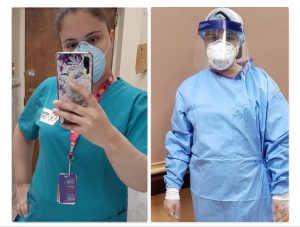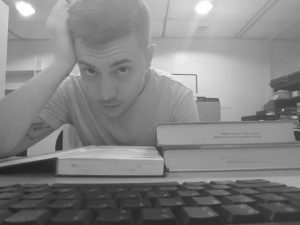Before the coronavirus became a pandemic, Sarah Farr experienced mild anxiety. She would shake, sweat, and slightly panic about things like completing homework on time or being late to work.
Now that the danger of COVID-19 has become more real, Farr’s symptoms have become more intense. Along with more frequent shaking and sweating, she now has stomach pain.
“Sometimes I would not sleep good at night because my stomach would hurt and the reason my stomach would hurt is because I don’t want to go to work,” said the 25-year-old special education major. “I don’t want to go to work because it’s scary.”
As the coronavirus takes its toll on the nation, it is making the anxiety of some Hunter College students worse.
“I have two parents who have underlying medical conditions and I don’t want to bring a virus home to them,” said Farr, who is also a recreational aid at a nursing home.

Farr, like many other healthcare workers, was expected to help combat the virus. So, she transitioned from working part-time to full-time. However, because of that change, she is also concerned about how COVID-19 will affect her academics.
“I just don’t have a lot of time on my hands. I feel like I’m being rushed,” said Farr, who manages her anxiety by thinking of other things when her symptoms arise due to anxiety-inducing thoughts.
Hhu, another special education major at Hunter, says that COVID-19 has made her anxious about being productive.
“I always have this anxious feeling that I have to play catch up,” said Hhu, who is going by her middle name because she is concerned that revealing her mental health status could compromise her future employment. Now that COVID-19 has awarded her some free time, she signed up for more volunteer hours and classes to stay ahead.
“People are starting to see that side where I might look like I’m doing a lot but I’m doing it out of fear of falling behind,” said Hhu, who taps her leg when she feels nervous. “But then I realize that I bit off more than I can chew and I have side effects like nightmares or spotting.”
While he is not currently experiencing any side effects due to COVID-19, senior Hayden Shannon, who was diagnosed with generalized anxiety disorder and panic disorder in his early 20s, expects them at some point in the near future. He says that his anxiety is not situational but results from a combination of stressors over time.

“I would expect in the next month that I’ll receive backlash from this time,” said the 29-year-old history major, who experiences shortness of breath, vertigo and lightheadedness due to anxiety. Shannon says he manages the anxiety through breathing techniques, talking himself out of the situation, and in extreme cases, medication.
For students who are facing difficulties related to the pandemic, the staff of Hunter’s Counseling and Wellness Services is offering a virtual discussion group that will work on positive coping strategies and problem-solving.
“We understand that this is a challenging time for Hunter students,” said Martin Pino, director of Counseling and Wellness Services at Hunter College, who expressed that what students are feeling at this time is normal. “Students are facing multiple psychological stressors, struggling with anxiety, as well as feelings of worry, isolation, and grief.”
This group will be offered Mondays, Wednesdays, and Thursdays from 1 to 2 pm on WebEx, from April 16 to May 27. The office’s other usual counseling services will still be available remotely.
As for the nursing home recreational aid and student, Sarah Farr, she says that she is optimistic about the situation and that the coronavirus is just something she will have to get past.
“I have hope that I’ll be OK because this isn’t the first time I’ve had work during my studies but COVID-19 has added another element to it.”

